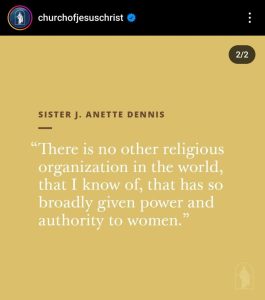by Cheryl Preston
It is all in the definitions.
In the last decade, it is said often that endowed LDS women have priesthood power. Our Sister Missionaries are repeatedly told they have been given the power and authority to teach and convert from the apostles, the same missionary power given from Christ to the apostles of old. I believe this.
Moreover, if you believe the only real priesthood keys on the earth are held by President Nelson, then any trickle down from him to women represents more priesthood power than that enjoyed by women in other religions.
I don’t know if this is what Sister Dennis meant, however.

Sister Dennis suggests that LDS women have more power and authority than women in other religions, notwithstanding that many ordain women to the priesthood or give women other forms of stewardship over large geographical areas, including men. She refers to the “broad” power of all the women in the Relief Society. Eighty million women each with a hint of power is not meaningful if there is no mechanism to gather the collective power-bits and make them efficacious in changing outcomes. Many women with some spiritual endowment (however derived), but without a vote, amount to very little influence within the religion.
Beyond ordaining women, many religions have women with significant decision-making power at or near the top. Even in small divisions or sub-groups, having a woman with clout makes a difference. The women below her can feed ideas and suggestions to the woman leader who has the power to implement them. Thus, having a female representative who has a legitimate place at the table in administering, managing, and structuring the organization also translates to power. Women without a woman leader in a decision-making position—a leader who honestly seeks to represent other women—do not have power. For representative power to work, in addition to a having a woman in a decision-making position, all women (the leader and the members) need to believe two things: 1. It is not apostasy or “uppity-ness” to suggest women have the right to be heard and treated seriously; and 2. Speaking is not futile.
Local Relief Society presidents have very limited ability to make decisions outside of choosing service projects, parties, and nurturing assignments. All other decisions must be referred to a male member of the bishopric or stake presidency, including the selecting of Relief Society teachers. Stake Relief Society presidents have even less power to make decisions, although they make suggestions. The worldwide Relief Society President is never depicted as making decisions separate from her male priesthood authorities, even in matters purely pertaining to projects involving motherhood, health care, or other humanitarian and “relief” services.
The bottom line is that, unless Sister Dennis’ quote is defined very, very narrowly, it does not ring true. It is no wonder that those words have presented such a disconnect. Common dictionary definitions of “power” and “authority” simply are not exercised by women in the LDS Church.
This fact does not mean women should jump ship. It does not mean that women should decline to be “all in.” Many women fully understand the gender limitations and wish they were fewer, or believe that, in the grand scheme, the dis-junction will be resolved. Nonetheless, these women still have a vibrant testimony and commitment to the church. They do, however, expect words from the pulpit to be more reflective of reality.
Cheryl Preston is an active member who loves the gospel and the church, but is not blind. She is a woman who recognizes real power and authority.
This post is part of a series related to the March 2024 debacle where 8,000+ comments, largely by women, responding to the LDS Church’s Instagram post quoting Sister J. Anette Dennis appeared to have been deleted for several hours. Though the comments were restored, Sister Dennis’ talk and the Instagram post have inspired significant thought and conversation.






12 Responses
“They do, however, expect words from the pulpit to be more reflective of reality.”
Exactly! I busted up laughing when I read that Instagram post. It was just so ridiculously out of touch
I really appreciated much of what was said in the devotional, up until this part. Then, my truth-detrctor went off: 🚨⚠️!!Gaslighting!!⚠️🚨
By the way, I love your bio at the end!!! 🫶💖👊
The church’s claim of men and women being equal is bogus until patriarchy is transformed into an equitable format. Plus, and this is key: We aren’t trying to compare ourselves to women from other religions, but to LDS men.
Thank you! When I read sister Dennis’s statement, I kept thinking about that line from the Princess Bride: “I don’t think that word means what you think. It means.”
This recent push to claim that women have always had priesthood power straight from the Father, once they are endowed, is gaslighting. I am 55 years old and remember well the many, many lessons over the years about the role of women being to support the priesthood, not to exercise it. Of course, we could hold the priesthood…by hugging our fathers, husbands, or sons! I am appalled by the efforts of leadership who are trying to assure the sisterhood by treating us like children and telling us we have something that we do not have, and have been told, in no uncertain terms, that we will NEVER have. And for heaven’s sake, the equating of priesthood to motherhood must stop. The counterpoint to motherhood is fatherhood. Priesthood is another matter entirely.
I agree. I am 42. The first time I can remember being introduced to the idea that women too have priesthood power was when I was serving as a YW President and the Temple President was speaking to the YW before a baptismal session. He made the comment that “all grown women have the same priesthood power as men, but they are only allowed to exercise it when working in the temple.” that would have been around 2005. Up to that point I had been taught presithood power could only be accessed by harkening through my husband and allowing him to use his authority.
Great guest post, thank you! It feels like anyone looking in from the outside would see automatically how ridiculous the IG statement is, but I see friends of mine doubling down online that it’s absolutely true. I so appreciate hearing members of the church standing up and speaking out for reality!
Terrific article! I appreciate how you were fair to Sister Dennis, outlining how her carefully chosen words were technically true from a very narrow perspective, while explaining how untrue the assertions ring under more standard definitions of power and authority.
I
Power is also the gift of agency and autonomy over our own spiritual and temporal lives. We as women are given this gift by God. However, too often our agency is blocked by priesthood holders who insist on setting rules for how we are to behave, many of which rules have nothing to do with commandments. If we disagree with a teacher, wear slacks to church, work outside the home, drink diet coke… we are “offending God.” In my ward, female calling-holders must have EVERYTHING — every activity, every service project, every picture in the newsletter, every song sung, approved by the bishop. I love this church, and I frankly have no desire to hold the priesthood. But we are not sheep or children. We are adult, smart women, with good ideas and professional skills. We need to be heard, seen, and respected.
I had a conversation with my feminist currently active LDS mother about this talk, this quote in the last few days.
I have come to the realization that I functionally preside in my household (technically I co-preside with invested stakeholder family members) and how I always have “presided” (sometimes poorly) despite being female. I am currently owning the process (with a lot of implications like “How do I do so” and “How did I get here”) and share my experience with my mother. This is a work that I have been in for years – and hopefully will move past soon.
This time, she cited this talk and this line of thought that “women are empowered by the authority of God like/that is the priesthood” as how “how wonderful it is that you had the authority you needed when you needed it to preside in your family when it needed done”. I understand that she meant it as a “salve for the past” and a “bonding point”. And she’s not wrong – “thank goodness Amy can preside/make decisions/run their family during tough times”.
She’s not “right either” because the “borrowed authority” I am using to “run the family” is the “disability/death/single parenting” clause that was put in “for emergency use only” – not as a “full time feature” on family framework.